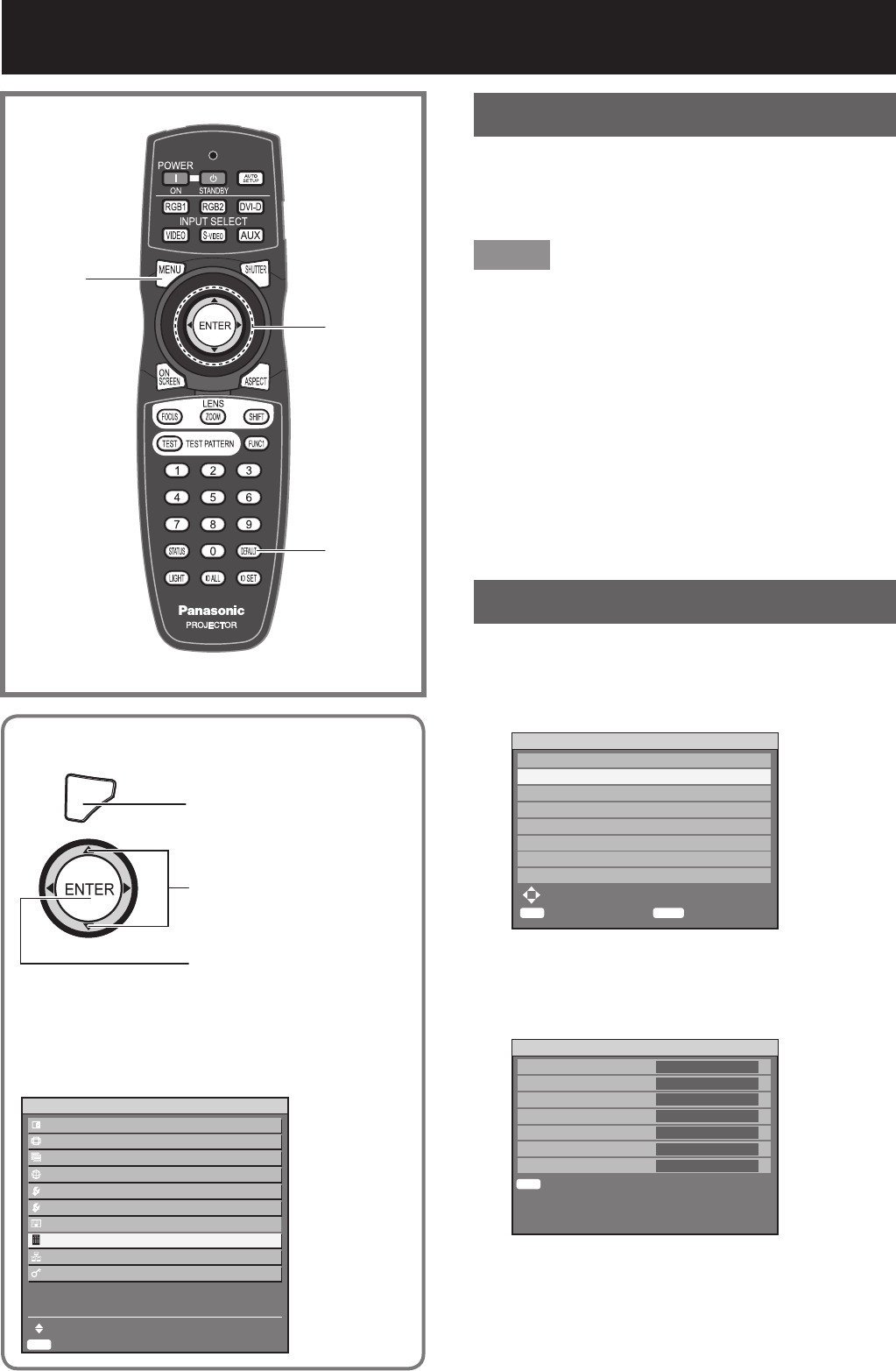
40 – ENGLISH
Registration of input signal data
The input signal data must be registered because
it is not registered on shipment of the projector.
MENU
Press to display the
MAIN MENU screen.
Press to select
“SIGNAL LIST”.
Press to display the
“REGISTERED SIGNAL
LIST” menu.
The memories extend over
12 pages (A to L with 8 data
items each, giving a total of
96 memories).
•
MENU
Press to display the
MAIN MENU screen.
Press to select
“SIGNAL LIST”.
Press to display the
“REGISTERED SIGNAL
LIST” menu.
The memories extend over
12 pages (A to L with 8 data
items each, giving a total of
96 memories).
•
MAIN MENU
PICTURE
POSITION
ADVANCED MENU
DISPLAY LANGUAGE
OPTION1
OPTION2
TEST PATTERN
SIGNAL LIST
NETWORK
SECURITY
MENU SELECT
SUB MENU
ENTER
MAIN MENU
PICTURE
POSITION
ADVANCED MENU
DISPLAY LANGUAGE
OPTION1
OPTION2
TEST PATTERN
SIGNAL LIST
NETWORK
SECURITY
MENU SELECT
SUB MENU
ENTER
Registration of new data
When a new signal is supplied, press MENU on the
remote control or operating section of the main unit.
When its data has been registered, the “MAIN MENU”
screen is displayed.
Note
The data of 96 input signals can be registered.
The signals supporting the installed input module
are input and their data registered.
The memories are numbered over 12 pages (A to L:
8 data items can be registered on each page), and
the data is registered in the unused memory with
the lowest number. If all the memories are used, the
data of the old signals is overwritten in sequence.
The names of the registered data are automatically
determined by the input signals and memory
numbers.
If a menu is being displayed, the new signals will be
registered at the instant they are input.
Renaming the registered signals
1. Press ▲▼◄ ► to select the
signal whose details are to be
displayed.
2. Press ENTER.
The “REGISTERED SIGNAL STATUS” screen
will be displayed.
The data items including the input signal name,
memory number, input terminal, frequency and sync
signal are automatically identified and displayed.
When MENU is pressed, the “REGISTERED
SIGNAL LIST” screen is restored.
•
•
•
•
•
•
•
•
REGISTERED SIGNAL LIST
A1:SVGA72-A1 RGB1 ---
A2:SVGA72-A2 RGB1 ---
A3:SVGA72-A3 RGB1 ---
A4:SVGA72-A4 RGB1 ---
A5:SVGA72-A5 RGB1 ---
A6:SVGA72-A6 RGB1 ---
A7:SVGA72-A7 RGB1 ---
A8:SVGA72-A8 RGB1 ---
SELECT
DETAILS DELETE
ENTER
DEFAULT
REGISTERED SIGNAL LIST
A1:SVGA72-A1 RGB1 ---
A2:SVGA72-A2 RGB1 ---
A3:SVGA72-A3 RGB1 ---
A4:SVGA72-A4 RGB1 ---
A5:SVGA72-A5 RGB1 ---
A6:SVGA72-A6 RGB1 ---
A7:SVGA72-A7 RGB1 ---
A8:SVGA72-A8 RGB1 ---
SELECT
DETAILS DELETE
ENTER
DEFAULT
REGISTERED SIGNAL STATUS
NAME
MEMORY NO
INPUT
fH
fV
SYNC.STATE
RENAME
SVGA72-A2
A2
RGB1
48.08kHz
72.17Hz
H(POS)
V(POS)
ENTER
REGISTERED SIGNAL STATUS
NAME
MEMORY NO
INPUT
fH
fV
SYNC.STATE
RENAME
SVGA72-A2
A2
RGB1
48.08kHz
72.17Hz
H(POS)
V(POS)
ENTER
▲▼◄►
ENTER
DEFAULT
MENU


















